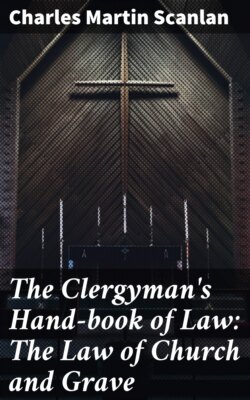Читать книгу The Clergyman's Hand-book of Law: The Law of Church and Grave - Charles Martin Scanlan - Страница 13
На сайте Литреса книга снята с продажи.
Chapter IX. Membership
ОглавлениеTable of Contents
110. Business, Religious Membership.—Unless there is some other law or rule to the contrary, the male members of the congregation over twenty-one years of age constitute the business membership of a religious society.202 But the question of membership of religious societies or congregations is left to be determined by the rules of the religious denomination to which they belong.203 And where a condition of membership is that the person must contribute to the support of the church and be a communicant, if he is not a communicant he is not entitled to vote.204
111. Regular, Doctrines, Support.—The ones who adhere and submit to the regular order and doctrines of the church, although a minority, constitute the true congregation.205 At least two things must concur to qualify a person as a voter: first, stated attendance [pg 075] at divine worship in the congregation; and, second, contribution to the support of the church.206 The list of members kept by the clerk or secretary of the congregation is evidence of membership.207 A person who denies any part of the system of theology received and taught by the denomination is not a member of the church.208
112. Factions, Authority.—Where two factions of a church, each claiming to be the church, try members of the other faction, a court may determine which of the factions is the authorized authority or that the action taken by either or both of them is nugatory for want of authority.209
113. Faith, Burial.—Whether a person died in the faith of the Roman Catholic Church so as to be entitled to burial in its cemetery, is not a question within the jurisdiction of civil courts, but must be decided by the ecclesiastical authorities.210
114. Rules, Membership.—Every denomination has the right to prescribe by rules, its constitution, or its by-laws, the conditions of membership; and any one who [pg 076] will not subscribe to and practise the doctrines of the denomination is not a member.211
115. Minor.—Where the legal members of a society that is incorporated consist of male members of the church of full age, when minor sons become of age, they become legal members of the corporation, provided they remain in the church.212
116. Officers, Non-Members.—It has been held that a person may be an officer or member of the church corporation or its temporal concerns without being a member of the denomination.213
117. Debts, Unincorporated Parish.—In Connecticut members of an ecclesiastical society formed by voluntary association under the statutes of the State are not individually liable for the debts of such society.214 But where there is no statute on the subject, the members of an unincorporated parish are liable for lawful debts contracted or ratified by them, and their property may be levied on for such debts [pg 077] incurred or judgments rendered while they are members of the society.215 The members of an unincorporated parish may be sued to recover the salary of a deceased pastor up to the time of his death.216
118. Execution, Property.—While an execution against a territorial parish may be levied on the property of a member of the parish, it can not be levied on property of a person who ceased to be a member before the levy.217
119. Incorporated, Subscriptions.—The members of an incorporated poll parish are not individually liable on a judgment and execution against the corporation, excepting on the unpaid subscriptions.218
120. Expelled, Merits.—Mandamus can not be resorted to to restore a member regularly expelled from his church, as a court will not inquire into the merits of the case.219
121. Lay Members, Appointed.—Where the statute provides that two lay members of the corporation of a Catholic parish shall [pg 078] be appointed annually “by the committee of the congregation,” the members of the congregation have no right to elect said two members, and those appointed in the proper manner are lawful officers.220
[pg 079]
